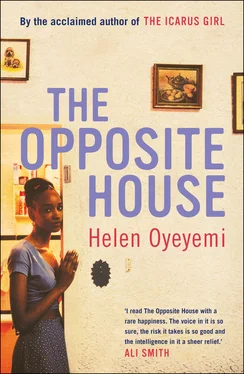Helen Oyeyemi - The Opposite House
Здесь есть возможность читать онлайн «Helen Oyeyemi - The Opposite House» весь текст электронной книги совершенно бесплатно (целиком полную версию без сокращений). В некоторых случаях можно слушать аудио, скачать через торрент в формате fb2 и присутствует краткое содержание. Год выпуска: 2008, Издательство: Bloomsbury UK, Жанр: Современная проза, на английском языке. Описание произведения, (предисловие) а так же отзывы посетителей доступны на портале библиотеки ЛибКат.
- Название:The Opposite House
- Автор:
- Издательство:Bloomsbury UK
- Жанр:
- Год:2008
- ISBN:нет данных
- Рейтинг книги:4 / 5. Голосов: 1
-
Избранное:Добавить в избранное
- Отзывы:
-
Ваша оценка:
- 80
- 1
- 2
- 3
- 4
- 5
The Opposite House: краткое содержание, описание и аннотация
Предлагаем к чтению аннотацию, описание, краткое содержание или предисловие (зависит от того, что написал сам автор книги «The Opposite House»). Если вы не нашли необходимую информацию о книге — напишите в комментариях, мы постараемся отыскать её.
The Opposite House — читать онлайн бесплатно полную книгу (весь текст) целиком
Ниже представлен текст книги, разбитый по страницам. Система сохранения места последней прочитанной страницы, позволяет с удобством читать онлайн бесплатно книгу «The Opposite House», без необходимости каждый раз заново искать на чём Вы остановились. Поставьте закладку, и сможете в любой момент перейти на страницу, на которой закончили чтение.
Интервал:
Закладка:
For six days I have been praying, really praying, a state of angry joy that I fell into through a crack in the bottom of my heart. I have not been able to close my eyes for longer than it takes to blink. I am back to childish bargaining with God for explicit support of my son, as if my son is special, or for advance pardon for the swift ending of my son, as if I am special. Or anything, anything, God give me anything.
Food: everything I eat, my mouth lets it go, my stomach heaves painful, sour streams. My breasts are rotten lumps hooked into my ribcage, and I can’t touch my body at all, I can’t. I keep holding my hands away from myself, or holding my hands together. But the afternoons ripen here in radiant languor as forty women draw a little more breath into their black and white cassocks so as to continue dying slowly from love. When it rains the sisters, capes heavy with water, rotate in fragrant clusters through the slate walkways of the chapel.
At the door, Sister Perpetua takes both my hands and looks at me from beneath the clean borders of her cowl. Her ‘hello’ smile is the same as her ‘goodbye’ smile. She lets me come, lets me go my way, looks at me now the same way that she did when I arrived a week ago. I tottered in on six-inch wedges with the meekest look that I could give her over the top of a pair of oversized sunglasses, the crown of my floppy brown hat settled around my ears and Aaron’s discarded khaki jacket, longer and looser than the black dress I wore beneath it, flapping open despite my best efforts to belt it in several places. She brusquely tells me that this time I came on retreat from a joyous heart, that I was here with her at St Catherine’s because I am being slain by the Holy Spirit.
‘Jesus is in your life,’ Sister Perpetua says again, while I look at her and do not think of Jesus at all because Sister Perpetua’s beauty is bewitched: her lips are a frozen red that thaws out into pink at the corners; her eyebrows climb to tapered peaks above dark chocolate eyes. Sister Perpetua has the face that Snow White’s mother had wished upon her. But it isn’t that something is keeping her young, just that something is keeping her beautiful. I love Sister Perpetua for stupid reasons: she does not whisper in Chapel but talks for God to hear; she has seen me crying and she just lets me cry; when she wants me to pray with her she covers my hands with her soft ones.
The first time I came she found me in the Chapel and told me about an African priest who the Church had confirmed was in heaven. She did not tell Chabella; she only told me, as if she knew that I needed it. I told her about the shadow at night, and she talked about the Cloud of Unknowing, how when God is near, you are driven into the darkness outside of reason and it is a good, sweet rest. I tried to explain that it wasn’t un knowing. But mystics are difficult to argue with.
I’m still not used to Aaron’s flat, even though I moved in four months ago, even though he calls it ‘ours’. The house is in the middle of a semi-detached row; always at attention, jutting straight up with a windowed stare that holds sleepy intelligence near its base, as if the right command could send it leaping sideways. I approach it with caution. I feel like an interview candidate arriving to be considered for tenancy by the house itself. I lose myself so far as to raise a hand to knock at the door though the keys are already dangling on their ring from the index finger of my other hand. We live in the bottom half of the converted two-floor house that Aaron’s dad, a man made thin by nerves and neatness and ownership of a real-estate agency, gave him for his twenty-first birthday.
The streets around the house are misted with trees and re-edged with cut-out-and-colour delis and small, glass-fronted restaurants whose clientele don’t seem to do lunch, or dinner, or anything other than beautifully hued cocktails.
Inside the house is a middle floor forced between the green-carpeted staircase that leads up to Miss Lassiter’s flat and the peeling wooden steps that lead down to Aaron’s. I am wary here; I remember that Miss Lassiter’s envelope is due today. Miss Lassiter is now Aaron’s tenant, though she used to be his father’s. She leaves monthly envelopes outside Aaron’s door without knocking. Aaron doggedly maintains that she’s shy, but I don’t enjoy Miss Lassiter. When I meet her on the stairs, she thrusts her walking stick out before her like a probe. The outlines of her face are buried in clasped whorls of wool; she wears stiff black gloves, and holds her fingers together so that her thumb is a loner. The gloves make her hands look like blunted hooks.
I tiptoe downstairs and open the front door of the flat. Immediately Aaron is filming me. Kente cloth is threaded into a vivid print belt for his jeans, his socked feet slip on the floorboards. I make a face at him; he lifts his eye away from the viewfinder and, smiling, directs me with his hand, showing me which slats of space I can walk in without damaging his angle.
‘So, Maja,’ he intones, and I know that he’s making a close-up of my face. ‘Who wins? Aaron or. . GOD?’
I hang up my coat and spread my hands in the shade; he frantically indicates that I should come forward and turn a little more to the right. I do.
‘What are you talking about?’
‘What am I talking about?’ He walks backwards, ignoring my attempt to try and get the camera off him. ‘My girlfriend goes off to a nunnery four times in as many months, and I’m not supposed to worry that she’s about to marry Jesus. .’
I stop at the kitchen door; Aaron is inside now, shored up against a crumbling wharf of green tile, stacked plates and opened jars. I look into the camera for what feels like forever — I look until I forget that I am seeing anything and my eyes spill over with tension water, and he is abashed and nervously shifts the camera.
When he puts the camera down on the kitchen table I see how tired he is, see the caved-in yawn lines around his mouth and the panda patches around his eyes. He comes to me and rests his forehead against mine. I only really notice the notations that exhaustion leaves on his face when I’ve been separated from the reasons for it: the broken braying of his pager; the fifty-six-hour cover shift at the hospital that upends us into a fraught, airless rectangle of calling each other at the wrong time, not answering calls from each other when it’s most important, me wondering what it means when he forgets to say ‘I love you’ before saying goodbye. His hair is getting too long. He is beginning a beard, and it’s in an awkward adolescent phase, bristling in patches despite itself.
I don’t want dinner, but he starts pounding steaming boiled yams for fresh fufu at the kitchen counter. The only help he lets me give is simple; heating up a chicken stew he’s already made. I like watching Aaron burn like this, his body clock hopelessly awry, forehead wrinkled as he revolves around the steel cog of his own nervous energy. I think he likes it when I try to sing him to sleep, although he doesn’t fall for it — he just looks at me with the covers wadded under his chin, wearing a smile of melting gold like a child’s. Sometimes he wakes up in the night asking what time it is and asking whether someone else finished the tourniquet job he started because he’s forgotten to go back, or asking who collected the X-rays. When he sees that it’s only me, he laughs and curls up against me and falls asleep again.
He eats dinner; I watch him skimming balls of dough-like fufu into a rich, dense stew. He asks if I want to talk about the retreat. With the question put as formally as that, I say I don’t. He’s relieved — almost immediately he changes tack and asks whether I’m singing tonight. I’m not, and he’s not on call tonight, so he says, ‘We should go and see a play or a film or something.’
Читать дальшеИнтервал:
Закладка:
Похожие книги на «The Opposite House»
Представляем Вашему вниманию похожие книги на «The Opposite House» списком для выбора. Мы отобрали схожую по названию и смыслу литературу в надежде предоставить читателям больше вариантов отыскать новые, интересные, ещё непрочитанные произведения.
Обсуждение, отзывы о книге «The Opposite House» и просто собственные мнения читателей. Оставьте ваши комментарии, напишите, что Вы думаете о произведении, его смысле или главных героях. Укажите что конкретно понравилось, а что нет, и почему Вы так считаете.












